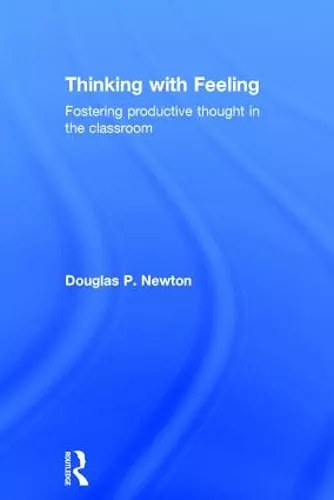Thinking with Feeling
Fostering productive thought in the classroom
Format:Hardback
Publisher:Taylor & Francis Ltd
Published:4th Mar '14
Currently unavailable, and unfortunately no date known when it will be back
This hardback is available in another edition too:
- Paperback£41.99(9780415819831)

Are emotions good or bad for thinking and learning?
Have you ever wondered why a good lesson of one year falls flat in another?
Why do students behave the way they do?
Teachers are expected to foster productive thought yet the neglect of emotion in the classroom, in favour of intellect, means teaching and learning is often not as effective as it might be. Thinking with Feeling explores what we mean by productive thought, its interrelationship with mood and emotions, how teachers can manage that interaction to improve teaching and learning, and what teacher trainers could do about it.
Synthesising the most important international research in the field, itoffers a framework for productive, purposeful thought - deduction, understanding, creative thinking, wise thinking, and critical thinking - and explains how mood and emotion can support and also impede learning. It considers the effect of the interplay of emotion and intellect on classroom behaviour, on students’ public performance and performance in tests, and how emotional labour can affect the teacher.
Illustrated with examples from practice, this challenging, thoughtful study offers education professionals a basis for understanding the interaction of emotions and cognition and making it a successful partnership in order to improve teaching and learning.
"A superb analysis of the driving force behind motivation and learning...This book is a must for schools interested in taking the learning to a new level."Dr Conrad Hughes, Director of Education, International School of Geneva, Switzerland
"Quite rightly shines a long overdue light on how emotions affect teaching and learning."Sir Paul Grant, Headteacher, Robert Clack Academy, London, UK
"In today’s world, there is often so much emphasis placed on the intellect that the interaction between feeling and thinking is rarely identified, yet alone addressed...Doug Newton has done a masterful job in connecting "sense and sensibility" in both theoretical and practical ways."Dr Ken McCluskey, Dean and Professor of Education, University of Winnipeg, Canada
"Addresses a frequently ignored area in schools by challenging our understanding about the interaction of moods, emotions and cognition in the classroom…It offers teachers invaluable practical advice on developing and sustaining productive thought in the classroom."Professor Mike Younger, Cambridge University, Cambridge, UK
‘In today’s world, there is often so much emphasis placed on the intellect that the interaction between feeling and thinking is rarely identified, yet alone addressed. Nonetheless, emotions can and do have a powerful effect on cognition and learning. Doug Newton has done a masterful job in connecting ‘sense and sensibility’ in both theoretical and practical ways. After reading this book, thoughtful, sensitive educators will realize that they have been touched by something very special.’ – Dr Ken McCluskey, Dean and Professor of Education, University of Winnipeg, Canada
‘This book addresses a frequently ignored area in schools by challenging our understanding about the interaction of moods, emotions and cognition in the classroom. It refl ects on how deductive thinking takes place within an emotional climate, explores the complexity of creative thinking and problem solving and discusses the role and effects of moods and emotions in the development of wisdom. Crucially, it offers teachers invaluable practical advice on developing and sustaining productive thought in the classroom, and offers an important contribution towards understanding how emotion–cognition concepts inform quality teaching and learning.’– Professor Mike Younger, Cambridge University, UK
‘Too often we ignore the crucial role of emotion in learning. Here is a book that will help schools understand the relationship between emotion and cognition, something that will help teachers understand their students’ learning in subtle, powerful ways. Professor Newton manages to bring an impressive level of academic study to the classroom in a book that is fascinating and useful for parents, teachers and administrators interested in the role of emotion in thinking. This analysis of the driving force behind motivation and learning is a must for schools interested in taking the learning to a new level.’– Dr Conrad Hughes, Director of Education, International School of Geneva
‘Teacher education and learning in schools is mostly based on cognition. But human beings are led by emotions. Newton‘s book is a Copernican change in thinking about teaching; he gives a deep and differentiated emphasis on all the emotional dimensions that affect learning. I recommended this book to all my graduate students to change their thinking about teaching in a way that is really helpful for the students.’– Prof Dr. Astrid Kaiser, Institut für Pädagogik, Carl von Ossietzky University of Oldenburg, Germany
‘This book quite rightly shines a long overdue light on how emotions affect teaching and learning.’ – Sir Paul Grant, Headteacher, Robert Clack Academy, London, UK
‘This book makes a welcome contribution to our understanding of the interplay between emotion and cognition in learning. It explores the role of feelings in influencing the kinds of thinking that tend to be valued in education. Professor Newton sets out to argue that thinking is more likely to be productive if emotions and reason work in harmony and that managing the partnership between the two can lead to more efficient and productive thinking. The chapters address important implications for teaching and learning and teacher education, providing valuable recommendations for practice.’ – Professor Sue Robson, School of Education, Newcastle University, UK
ISBN: 9780415819824
Dimensions: unknown
Weight: 540g
204 pages